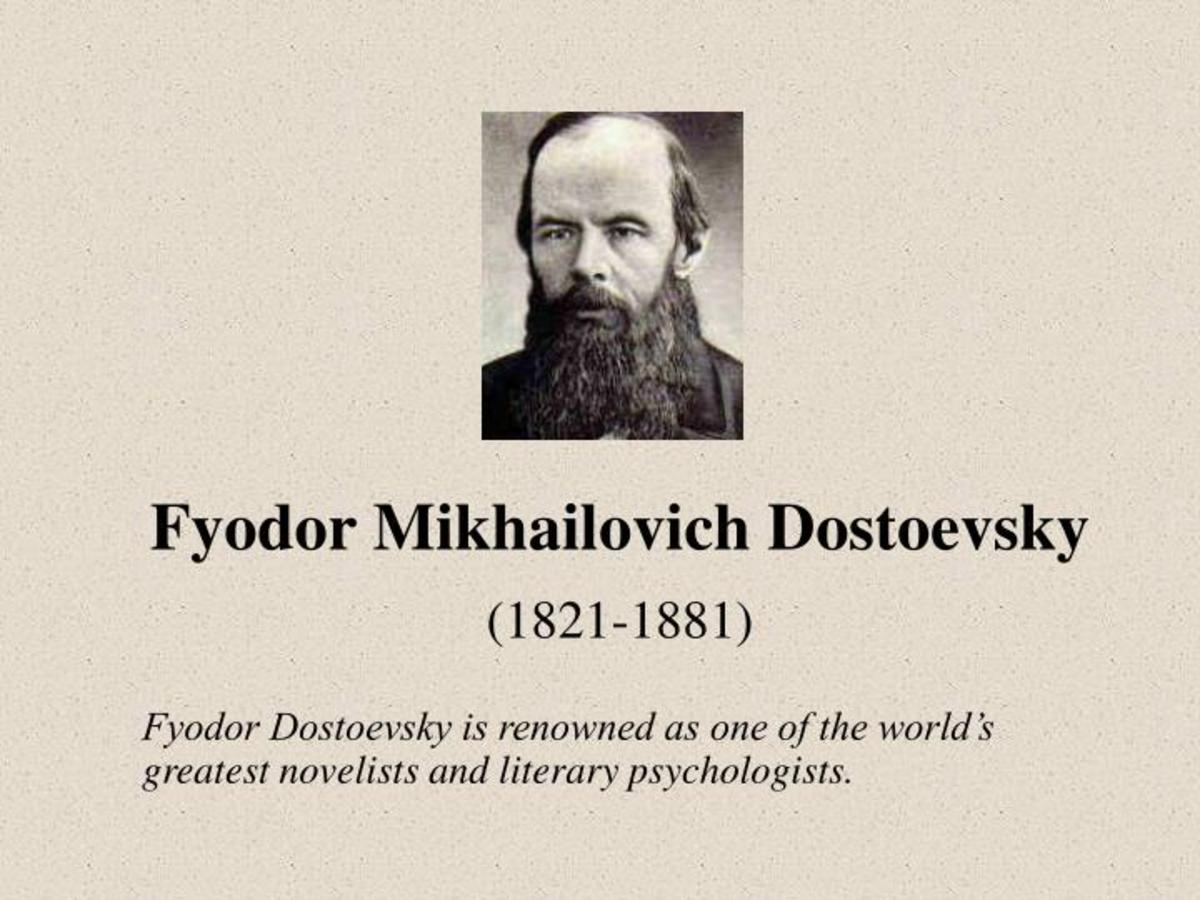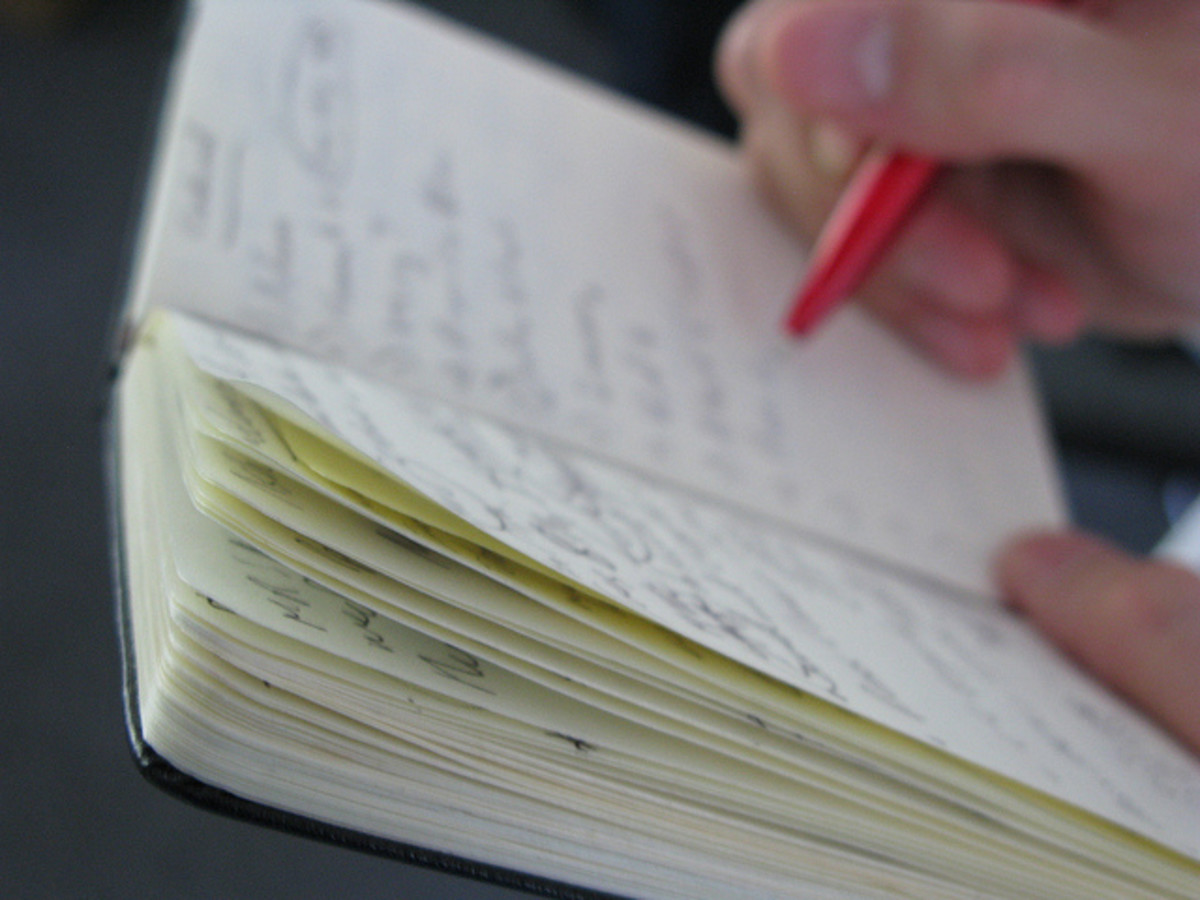Fyodor Dostoevsky's 'Notes from Underground'

A Close Reading of the Opening Paragraphs
Fyodor Dostoevsky’s ‘Notes from Underground’ is a self portrait of a forty year old, unnamed man, although he does refer to himself as an “anti-hero”. It is split into two individual parts; Part 1, The Underground and part 2, Apropos of the Wet Snow. The first portion takes place in the 1860’s while the second part tells a story of twenty years previous. The Novel is a series of notes written by the ‘Underground man’ who feels he is an outsider, someone who hasn’t become an ‘insect’ in society. His notes are a way of attacking the society that he lived in and although he continuously states that he is not writing them for anyone to read, he addresses the readers often calling them “gentlemen”.
From the very beginning the narrator, who introduces himself as the ‘underground man’, describes himself as a ‘sick man’ and ‘a spiteful man’. This suggests to us that the man is pessimistic and has poor self image. The underground man tells us he has a problem with his liver and then goes on to explain that he isn’t receiving treatment for it. He tells us he respects doctors and their medicines but he won’t get treatment out of ‘spite’. He also admits that he understands he is not hurting anyone but himself in not getting help for the ailment. This insinuates that even though the man may appear insane in what he writes (“I can’t explain exactly to you whom I’m trying to harm by my spite.”[1]) he is aware of his actions and the consequences; therefore the question of sanity itself is a contradiction.
Contradictions are something the underground man uses a lot in his notes. The first is when the narrator writes about his liver, he says there is something wrong with it, then adds he doesn’t know exactly what. This seems like a reasonable statement to some extend but then the man says he’s not sure if it is his liver with the problem: A statement that directly contradicts the first. He says “I am educated enough not to be superstitious, but I am superstitious.” This satirical statement derides the self-importance of a society that places all its principles on science and rationalization. He additionally writes that he in fact “could never really be spiteful.” Is the underground man truly insane or is he trying to confuse the readers for his own “pleasure”?
The narrator also enjoys undermining society which he indicates when he writes “That’s probably something you can’t bring yourself to understand.”[2] He refers to “gentlemen” in his notes which may represent society in the 1860’s. It is also possible that he feels the need to patronise the “gentlemen” in order to make up for the fact that he didn’t “become anything”. By making it sound like he knows what the ‘gentlemen’ are thinking he is appearing more intelligent than them, e.g. “You’re probably thinking, gentlemen, that I want to make you laugh. Well, there you’re mistaken too.”[3] This is an attempt to demonstrate free will by the narrator. He believes that society is taking away peoples identities and he also assumes this is why people do not always act in their best interests and sometimes even act against them. It is also an attack on the customs of the nineteenth century where intellectual people can’t make anything of themselves but fools prosper.
This is often something a sociopath is known to do. In order to make their way up the social ladder they speak about ‘facts’ and use big words to appear more intellectual, but also to help their own self esteem, e.g. “As in fact, I could never really be spiteful.”[4] The Underground man has very poor self image and also states that he has “never managed to become an insect”. This suggests he wanted to be something in society.
The narrator has an odd sense of humour which he conveys from the beginning. When he writes about never taking bribes and compensating for that by being rude to people he includes “That’s a rotten joke.” Even though he notes the joke may be in bad taste he refuses to take it out. The man complains about various ailments often which implies that he is a hypochondriac, e.g. he suffers from insomnia which he apparently has “always been like that” and he has a problem with his liver.
He appears to want to open up to the readers when he writes “I never even managed to become anything”[5]. This is a comment that sounds sincere but then he follows it with a line of contradictions, e.g. “Neither spiteful, nor good, neither a scoundrel, nor an honest man, neither a hero, nor an insect”[6]. This is also the case when it comes to him describing himself frequently as “overly conscious” and a “spiteful” man. This all shows that the man doesn’t know who he is, he feels a lack of self purpose in life.
The narrator makes it clear throughout the beginning of his notes that, although he is extremely aware of what others think of him, he says he doesn’t care about it, e.g. “It is all the same to me.” This portrays the man as quite sadistic and may be proved in the sentence “I felt inexhaustible pleasure, whenever I succeeded in upsetting someone.[7]” He even admits that he “enjoyed being rude”. He addresses the readers frequently and analyzes and contradicts his statements, possibly fearing judgement.
Also narrated in the notes are his thoughts on an “abundance of elements within” his mind. This, to any “gentlemen” of clear mind, sounds like an insane statement. It’s possible the underground man is talking about his conscience telling him he is wrong to be spiteful towards people or maybe he is writing about a voice in his head telling him not to lie about not being spiteful. With the underground man it is hard to tell, but I’m quite sure that was his intention. It may be highly likely that all of what the underground man says is untrue. This is due to the fact that he is conscious of the readers and feels judged by them. The man is a perfect illustration of an unreliable narrator.
The first few paragraphs, although somewhat confusing, give a clear picture of the underground man’s character. It gives us a sense of the thoughts that preoccupy the man’s mind. The man despises the society he is surrounded by; the weather is bad in St. Petersburg and the city was built on bureaucracy. This is proved when he talks about people taking bribes as if it were common. This, the underground man explains, is the reason he is bitter towards society but he is also aware that he is powerless against it which is the reason he writes his notes. It appears that the underground man is taking his anger on society out on himself in spite: not seeing a doctor about his illnesses and staying in a city that he clearly does not like. The man’s enjoyment of personal shame and pain is a clear indication of his masochistic tendencies. The man is also acutely aware of his self-conscious. His notes may seem irrational but he appears intensely aware of every thought and feeling that crosses his mind. It is this awareness that exposes him to the “opposite elements” inside his mind. This is why he is unconfident about his actions and why the fictional author attacks contemporary theories on life and humanity.
‘Notes from Underground’ is a prime example of Dostoevsky’s psychological ability to portray a character encouraged by ambiguous urges. The fictional author reveals many aspects of his personality in the first few paragraphs such as how he is resentful, self-contradictory, alienated and reflective. The novel is a way for Dostoevsky to express certain opinions and ideas through the underground man’s mouth. The underground man is judicious of rationalization, egotistical beliefs and totalitarianism. It is these things that are pushing him even further underground. In the first paragraphs, ‘Notes from Underground’ is an impressive character profile that leads way for the rest of the novel.
It is through the perplexing writings of a protagonist that Dostoevsky introduces the second part of his novel. It portrays the values of society and the thoughts of a clearly insane man.
Bibliography:
Enotes.com, http://www.enotes.com/notes-from-underground, (2010), (06/12/10)
King. Elizabeth, (2010), Symbols in notes from underground, by Fyodor Dostoevsky, Helium.com, (05/12/10)
Wanner. Adrian, (1997),The underground man as Big Brother: Dostoevsky's and Orwell's anti-utopia, Findarticles.com, (02/12/10)
References:
[1] ‘Notes from Underground’, Fyodor Dostoevsky, (2009), Page 1, paragraph 1 [2] ‘Notes from Underground’, Fyodor Dostoevsky, (2009), Page 1, paragraph 1 [3] ‘Notes from Underground’, Fyodor Dostoevsky, (2009), Page 5, paragraph 3 [4] ‘Notes from Underground’, Fyodor Dostoevsky, (2009), page 4, paragraph 2 [5] ‘Notes from Underground’, Fyodor Dostoevsky, (2009), page 5, paragraph 2 [6] ‘Notes from Underground’, Fyodor Dostoevsky, (2009), page 5, paragraph 2 [7] ‘Notes from Underground’, Fyodor Dostoevsky, (2009), page 4, paragraph 1






